Save money by learning how to grow a peach tree from germinated peach pits. (It works for plums and cherries too!)
How to Grow a Peach Tree From Seed (Hint: Don’t Toss Those Pits!)
Save money by growing a peach tree from seed. It’s amazingly easy! My video on how to germinate peach pits has more than 500,000 views since I posted it a few years ago. Watch it below.
Since posting that instructional video, I have received a lot of comments and e-mails from people thanking me for showing them how to grow a peach tree by planting a peach pit.
Recently, my friend Amanda sent these two pictures of her peach-sprouting success.
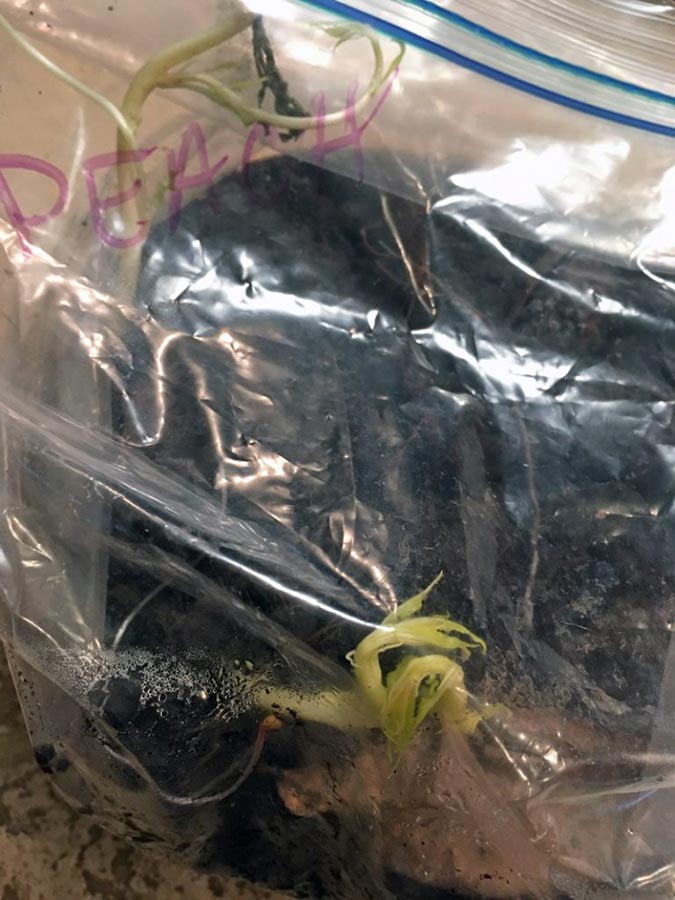
How Do You Germinate Peach Pits?
Some years ago, I discovered in some dusty corner of the Internet that peach pits require cold stratification to germinate. Cold stratification is a technique used to simulate real-world conditions that a seed would get outdoors after a frozen winter that gives way to a warm, wet spring.
There are six methods of cold stratification to choose from when growing a peach tree from seed:
- Cold water soaking
- Refrigeration
- Fall planting
- Winter/solstice sowing
- Outdoor treatment
- Snow planting
I put this knowledge to the test with great success, starting about 50 peach pits I found beneath an abandoned and squirrel-ravaged Tropic Beauty peach tree growing a few miles from my old place in North Florida.
I did this experiment despite the fact that there are hordes of small-minded gardeners who take great pleasure in lecturing everyone about the utter worthlessness of starting fruit trees from seed.
These people are wrong.
You May Also Enjoy:
“How to Grow 21 Amazing Fruit Trees From Seed”
Here’s Proof That Growing a Peach Tree From Seed Works!
Here’s a video I did showing some of my seed-grown peach trees in fruit:
And here are two pictures of some of the delicious fruit I got as a result of germinating peach pits in my very own refrigerator:
In their second year, my two seedling peach trees produced about 5 gallons of fruit. They continued to massively outproduce the grafted peach trees I planted before them, plus they grew with more vigor.
Knowing how to grow a peach tree from seed is a great thing to learn, and parlaying this into growing a variety of fruit trees is a huge amount of fun too. Check out this video on how I germinated other fruit trees from seed!
Sometimes the “experts” aren’t necessarily correct. They are just people who say things adamantly because they’ve heard other people say them. Heck with that.
Learn the tricks to planting a peach pit, and you get a free fruit tree. Easy!
You May Also Enjoy:
“Planting Fruit Trees in Fall: 11 Tips for Success”
The same method works for plums and cherries too. And if that’s not enough, you can read about sprouting avocados here.
Finally, here’s how to grow a peach tree by germinating peach pits, cartoon-style:

Note: I’ve found success both in removing the seed kernel from the hull and in planting the whole pit intact.
What Do You Think?
Have you had success growing a peach tree from seed? Or if you are just now hearing that planting a peach pit is possible, let us know how your own germination experiments go! We’d love to hear from you in the comments below.
______________
This is an updated version of an article that was originally published on July 7, 2017. The author may not currently be available to respond to comments; however, we encourage our Community members to chime in to share their experiences and answer questions!
The Grow Network is a participant in the Amazon Services LLC Associates Program, an affiliate program designed to provide a means for our team to earn fees for recommending our favorite products! We may earn a small commission, at no additional cost to you, should you purchase an item after clicking one of our links. Thanks for supporting TGN!
David The Good is a Grow Network Change Maker, a gardening expert, and the author of five books you can find on Amazon: Compost Everything: The Good Guide to Extreme Composting, Grow or Die: The Good Guide to Survival Gardening, Totally Crazy Easy Florida Gardening, Create Your Own Florida Food Forest, and Push the Zone: The Good Guide to Growing Tropical Plants Beyond the Tropics. Find fresh gardening inspiration at his website TheSurvivalGardener.com and be sure to follow his popular YouTube channel.
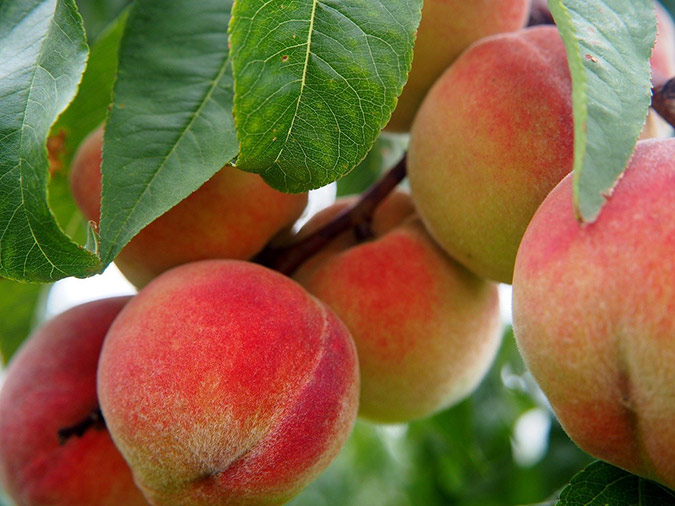
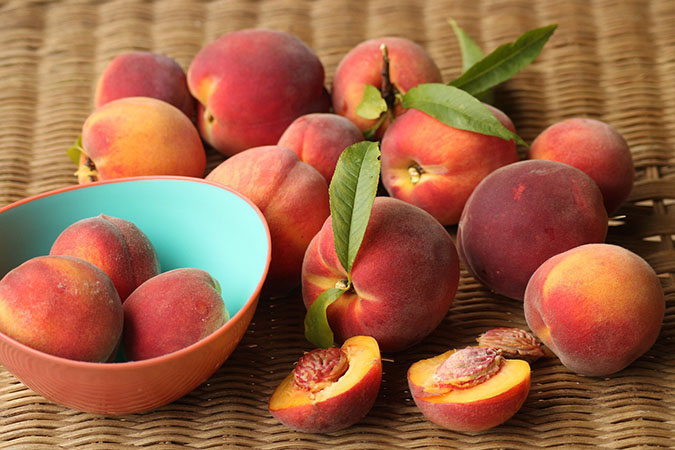
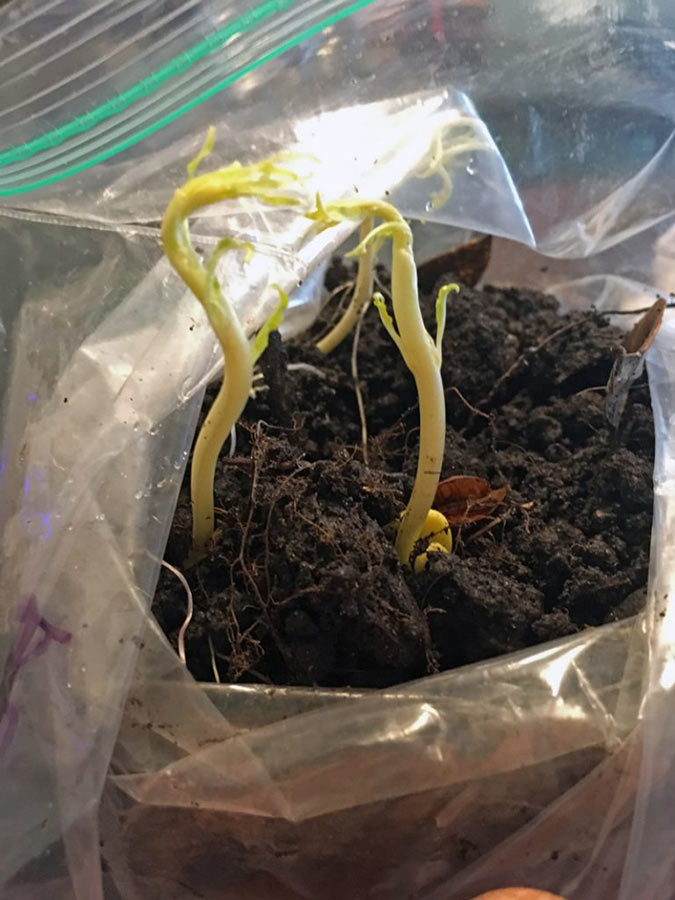
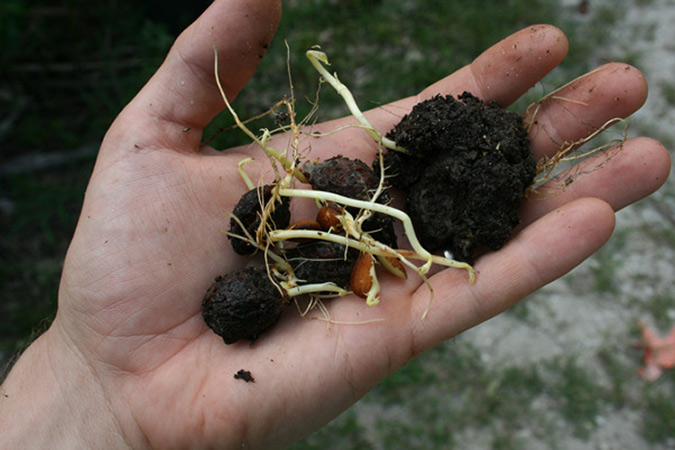
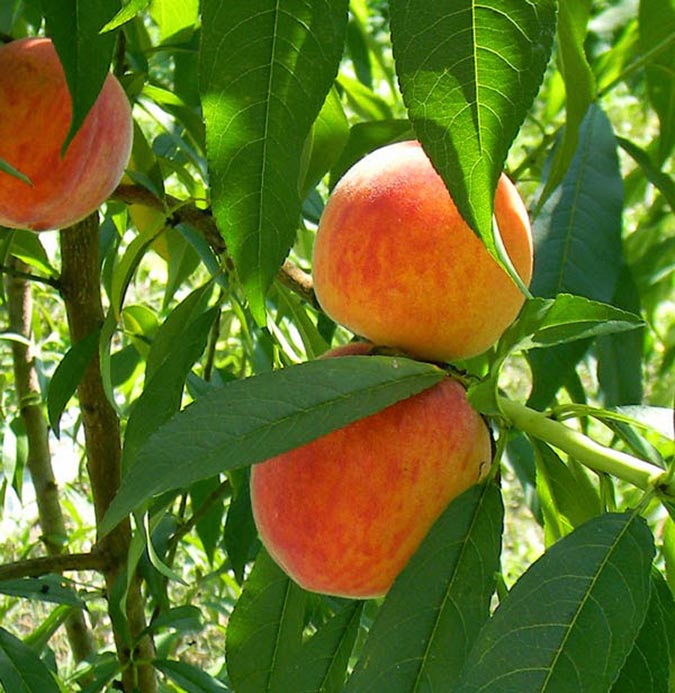
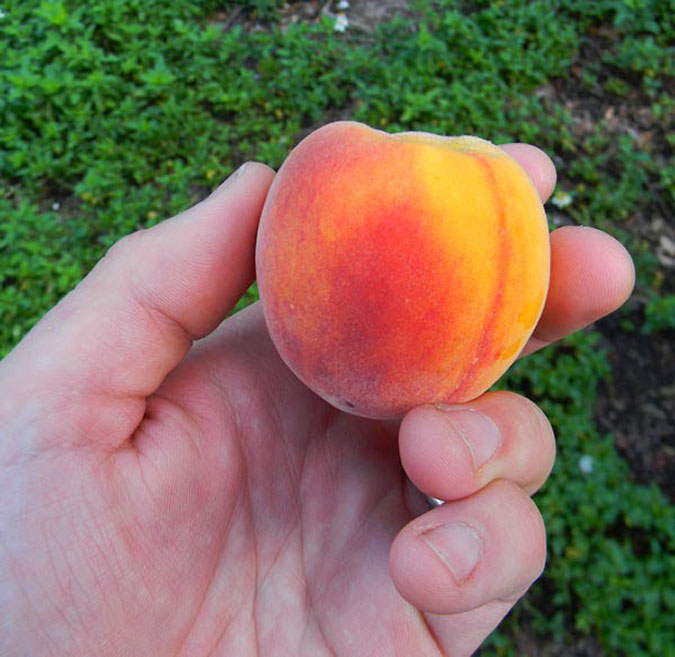







COMMENTS(64)
How long after you started them from seeds did you have your first harvest?
I kinda find it hard to believe that the second yr they produced gallons of fruit. How much fruit per seedling?
Planting a young peach tree or a peach pit will not give you fruit the first year. You must wait 3 to 4 years before it starts to produce fruit, notes the Alabama Cooperative Extension System. Before this time, the tree will be too small to support full-sized, harvestable fruit. During the first, nonproductive years the tree’s energy is concentrated on the tree’s growth.
Hmm I got two plums off tree planted from seed second year and it had grown to about Seven feet . Maybe it depends on soil, sunlight amount, watering, and fertilize and mulching with some good mushroom compost and wood chips.
We got a couple of peaches when a tree was a year and a half old. That’s not common, though. At 2.5 years we got a couple dozen. Third year the tree was loaded but frost took them. Peaches really produce quickly. Expect 3 years for the first fruit, but earlier is more than possible.
David will peaches and other “temperate zone” fruit trees grow in the tropics? What about nut trees like pecans or walnuts? I currently live in Nicaragua and am wondering what fruit trees would grow here. My husband loves cherries, and I love peaches, but I didn’t think they would grow here. Am I wrong, or right about that?
Apples will grow in the tropics with some special care. I don’t think stone fruit will. You can grow many wonderful things though. Mangoes, Barbados cherry, mamey sapote, etc. Be happy!
Cherries, peaches and nuts typically require a number of “chill hours” (hours at temperatures between 32 and 50 degrees) to achieve the dormancy needed in their cycle. Many varieties are listed as needing hundreds of chill hours while others require less than 100. You can search the Internet for “low chill” varieties. Some nurseries specialize in them. There are case studies of people successfully growing varieties that are not rated for their local chill hours – other factors may be involved
For growing some stone fruits in tropical settings, I’ve heard of people dumping ice around the base of the trees during the coldest part of their year, to push the climate a little further.
For us on a hillside in southern Portugal, we plant cold-needing trees at the bottom, next to the pond, & have had some success with the cherry trees because we get a few light frosts during the winter.
We started a compost pile near that pond, & found that in the Springtime, we had dozens of little seedlings emerge from composted pits: peaches, cherries & apricots. So we lightly raked them to scatter the seeds & let them grow the first season & will transplant some out to give the rest more room this Spring. We already had transplanted a peach tree from our first compost pile, it was the tallest, healthiest two-year peach tree I’d ever seen!
No more buying grafted trees!
Thanks for the information. Though I think I’ll just let the compost pile & winter weather do the work for me.
Sherilyn,
David mentions a variety of peach called “tropic beauty” in the article that he grew in Florida. That might work for you. Cherries are doubtful, but do your own research, I might be wrong. However, why not take advantage of the environment you’re in and grow tropical fruits and nuts? You can grow mangoes (yum!), papayas, bananas, pineapples, star fruit, passion fruit, oranges and lemons and other citrus, avocados, dates, figs, acerola cherries, acai and other tropical “super fruits”, coconuts, cashews, macadamia nuts, etc. All the things temperate zone gardeners wish they could grow. As the saying goes, “bloom where you’re planted.”
I almost forgot, you can also grow Theobroma cacao, otherwise known as chocolate trees. You can grow your own chocolate! What could be better than that? Your own coffee, too if you’re into coffee.
David, I live in Dallas Texas and my son keeps asking me to get him a cherry tree. I am using your instructions on some other organic stone fruits but the type of cherry that might possibly do well here isn’t anything like what we get in the stores. Do you know of a source for the seeds?
Someone’s yard would probably be the best place. Look on Facebook for Dallas Garden clubs and such and ask if anyone can give you a few cherries next time they have some. Try calling Womack’s Nursery in DeLeon for trees. Probably no warranty on cherry trees. You will want one with low chill requirement, probably sour cherry. My friend used to have a small cherry tree/bush in his backyard in Dallas that had small very tart cherries they made jelly with, but he moved.
You could try Barbados cherry/ acerola cherry. Both grow here in Florida, I’m guessing you’d be about the same zone.
Any ideas on growing in a state like Wisconsin where we have true 4 seasons?
I live in wisconsin and grow what i find seeds for. Today I have fig trees, lemons, manderines and a few more. The only thing I can do is get T5 daylight fluorescence and grow them in a closet bonsai. Bar none it’s my favorite hobby but in a shtf situation it’s best for me. The small trees produce full size fruit so you have to prop your fruit. I have just start mine so haven’t gotten fruit yet but keeping them small you put them through a lot first and second year they grow fast. I hadn’t thought about the peaches and plums having to grow in the house so I’m probably moving my rig to the basement. I planted guavas this year too. Have fun make a fairy garden it’ll look cute in the yard in the summer.
So, do you crack the pit open or not?
Thanks!
; 0 )
I compost everything in my kitchen and the peach seed seem not to compost very well. I have gotten so many peach seedlings in my backyard. I left one on the same place it sprouted last year. This summer it produced many sizeable sweet white peaches. Yum!
The idea sounds great, but here in hardiness zone 4a peaches, apricots, and sweet cherries are fruits that will not survive without good winter protection. I had a peach tree once that lasted through one season but died the next, even though it was well covered. The only way I might make this work would be to buy some locally grown varieties the next time I travel far enough south to where they actually will grow and, if the pits sprout, try to grow them in a mini-greenhouse. I may try plums though.
I have 2 peach trees in upstate New York. They produce very well most years after 4th season . Plums also . But all fruit trees up here depend if we get frost after blossoming.
Does it work the same for plums, apricots and nectorines too ??
Thanks Im gonna give it a shot !!
I just came back from my nephew’s house with a bag full of peaches of an unknown variety that were growing well in zone 5b (They came with the house he bought). I am in 4a, so it’s time to try pushing the zone. I look forward to seeing how well they will sprout and grow here with some winter protection.
Update: I am still waiting for the peach pits to sprout, but think they may have been too immature when I collected them. I will have to try again next summer. I did find some kind of native cherry tree growing on my property though, and after eating the cherries, I put a handful of the pits in some moist dirt in my refrigerator. I am happy to report that I now have two dozen baby cherry trees started.
I live in the interior of Alaska, winter temps can get down to -50 to -60 for days at a time. Will this work if the plants were in pots? Will they still give fruit?
You should definitely plant the pot in the ground over the cold season. I’ve killed my share of plants leaving them in pots over the winter.
Have you had any issues with peaches from orchards that use almonds as pollinators? If the accidental crosses don’t produce good peaches, do they typically produce good almonds?
I need to known that peach pit can germinate in Nigeria
Please
Step1 I need to know will
Is ten day put on sunshine
Or
David, thanks for the awesome idea. Our little peach tree’s small harvest is just about ready, and now I know what to do with the pits. 🙂
Loved your cartoon tutorial too! LOL
I am going to try the peach seed thing and I hope it works for me too.I have a Apple tree I started from seeds of a Apple that I ate .
Thank you for the information.
David, I grew my first peach tree from a seed pit. I just dropped a pit in the ground late fall 2 yrs ago. I was surprised in the Spring of the first year it had grown rapidly to about 2 ft. By the end of the season it had grown to almost 5ft. This year(2nd yr) it had grown to over 8ft and still growing and amazingly it bore fruit already. Sweet nice size peaches. Can’t wait until next year. Only one problem, do you spray the tree to keep the insects from boring into the peaches. I found little black specks on them then some small holes which ended up a small worm which went straight to the core.. if you spray them do you have any suggestions.
Can this be done in Northern states?
Thank u . I brought home to ms .from wa lot of peach seeds.
I am confused. In the video you planted the pit with the kernel in them. In the cartoon the kernel is removed from the casing and you plant the casing not the kernel. Doesn’t the plant grow from the kernel and not the hard casing or am I wrong?
do you plant the cracked pit or the kernel? if the pit is to be planted, why take the kernel out? I can’t wait to do this!! Love peaches. Thanks so.much
Julie
I would love to know how to grow so many fruit plus veggies hope you can help
I got my peach seeds to sprout in about 12-17 days with this method.
Can you grow peaches in containers? Indoors
Are you putting the left over pit, or the kernel in the fridge? I would think the kernel.
Thank you
Question. Do I take the kernel or the put and put in moist soil? Do I cover that kernel or pit with soil? Do I need to water the soil in the refrigerator during those two to three months? Sorry. I’m new to this and want our home to become self sufficient Do you know anything about tangerines in a pot? I have a greenhouse.
Thanks, I have to say I am glad I am not the only one knowing how to let nature take its course, I have been doing this for 5 years and it started in Massachusetts all the way to Texas, I have planted peaches, apple, and orange trees, but wait, I have now mango and avocado. I must say it is great to accomplish a great plantation without all the master degrees and chemicals. Thanks for sharing I will make this a topic to share. Maybe I can share some pictures soon. Thanks.
Looking at the pictures of the fruit, will they be that small, or was it just that variety? Looks like fun!!
Hi there! I like your peach pit article. One thing I felt important to mention is that peaches and nectarine seeds have pretty high levels of success in producing trees with luscious edible fruit, but that it is not guaranteed. Sometimes they result in trees that do not produce many flowers, thus no fruit at all (I had a wonderful strong yellow nectarine tree which fit that description), whilst others will produce plenty of fruit which are not particularly delicious even with plenty of water and fertiliser. And you are right about plums and cherries, except that seedling cherries are notoriously likely to produce trees that do not set much fruit or which produce a lot of very small cherries. Seeds from old varieties of European Plum such as Prune, Greengage, Damson and Cherry-plum are fairly likely to produce something approximating their female parent, but as plums cross breed easily you are also quite likely to get something of very mixed blessing. Some could be delicious, others not. And when it comes to Apples, they can produce absolutely wonderful results, but more frequently are inedible or only good for cider-making or cooking. Avocados can also produce fantastic results. They just need a pollinator of another variety. Kensington Pride Mangos are well known as being good to grow from seed. So to cut a long story short, I also encourage people to try growing fruit from pits, but they need to know that the results may be indifferent. But they may exceed expectations as well. So it’s all fun.
And to add, if you get a strong tree with no flowering or no good quality fruit, all is not lost. Learn the art of grafting. It is actually quite easy. There are plenty of books and websites about. You can even multi-graft a single tree so you have the original plus any number of your favourite varieties of peach/nectarine on one tree. Or plums on plums etc.
Thank you for you post on this! Very helpful! Also, a fun project to have the kids help me with! I have lemons to that we are going to try next!
Brittany, I planted a lemon seed from a store-bought lemon, grew it inside in a south window and it got seven feet tall. The top limbs eventually drooped down and are now branching out upwards. I leave it in the sun outside in the summer and bring it in for the winter. It is about four years old, and hasn’t blossomed, yet, but I’m hoping someday it will. The leaves, when crushed, smell like lemons, and they are shiny and beautiful. No pest problems at all. Happy growing your lemon tree!
My mom use to grow peach trees by cracking the pit getting the seeds then take them outside dig a hole and she would have a peach tree. No lie but I could never do it. Going to try this next year. I have two peach trees loaded but we have started a fruit tree fields with my in laws so I will try this.
In Arizona I followed the steps and now I have sprouts in the bag in the fridge. Will the trees live in the heat here once I transfer the plants outside? Everything I’ve planted here does from the summer heat.
I’m not sure. I would try planting where the tree will get a little shade in the afternoon. The western sun is brutal. Also, mulch heavily around the trees. That can keep the young roots from getting cooked in the ground. Good luck!
One could also make a temporary arbor for the little trees out of old lace curtains. They will get both sun and enough shade to protect them.
Looks like a fun project
Dang it, David! How many awesome projects do you have for me? You know I can’t just NOT do this now. Maybe if I spin it as a homeschool project, my wife will let me expand the orchard. Ha!
I have been saving the peach and plum pits for this very thing. Thank you for sharing.
Aren’t most peaches hybrids, like apples, meaning that the seed does not produce the same variety as the parent? In the case of apples, I’ve always heard that the seeds from a big sweet red apple may produce a tree that has small, hard sour apples.
Mark, I don’t know how many peaches and other fruits are hybrids. Even if they are and the seedling reverts back to a parent, it will still produce a peach, or cherry, or whatever. Apples are heterozygous, which means that the offspring come out differently from the parents, as happens with humans, dogs, and cats, for example. So when you plant an apple seed, any number of characteristics can show up and you can get an apple vastly different from the parent. This is why when a desirable apple shows up, that apple variety must be cloned in order to preserve its characteristics. I hope this answers your question.
Can the seeds be sacrificed by boiling in water? I’ve done this with other seeds.
Sorry. Scarified not sacrificed
As Ralph mentions above … some trees do not produce fruit … or poor quality fruit… but if the tree is healthy and vigorous … it is an ideal “root stock” to graft onto whatever variety you wish … and more than one …
Great video, I love to experiment growing things in fact I have two Haas avocados the I grew from seeds.
Is it possible to either freeze the pits/seeds and begin the sprouting process nearer to the Spring?
I can only agree. I have done the same. Only I didn’t have to propagate them, they come up themselves like weeds all over our yard and now particularly under the trees that have grown from these seeds. We have cold winters. Summers are very hot and dry though with max 400mm rain annually. They are so hardy and grow so profusely though I am thinking of using them as a pioneering plant to regenerate the soil, for wind breaks and for mulch. I plant them out next door on someone else’s property where they never get watered and they still flourish. I need to plant more out there so that hopefully the parrots will leave my trees alone lol. The variety has been interesting except of one tree that only grows golf balls. Absolutely jam packed with golf balls, they never ripen, they stay so hard not even the sparrows can penetrate much into them. That one might have to be my mulch experiment! But the rest are prolific and wonderful fruit. I hardly prune them btw. I am hoping the bigger they grow the deeper the roots and they may hit water somewhere below. I also like them tall for more shade. We need lots more shade.
When I was a kid living in El Paso — waaaayyy out in West Texas (“are we there yet???”) my dad did amazing things with that sandy desert soil. One thing in particular was growing peach trees — from seed. He actually just threw them out in the yard, and the next spring there was a tree! My childhood mind thought it was magical… something like Jack’s magical beans! I still remember the wonderful freestone peaches we harvested off of those trees!
I’m wondering why you have to take out the kernel from the pit. When I was a child in Massachusetts, we had a volunteer peach tree growing outside our house where someone had tossed the pit. I don’t know how long it sat there, but it definitely got cold stratified. We had peaches from that tree for years.